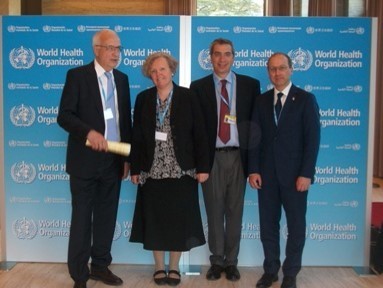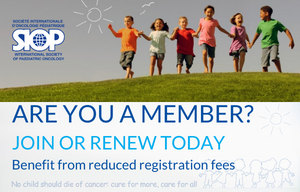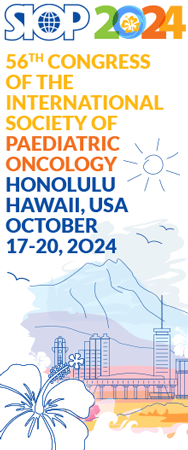WHO 154th session of the Executive Board (EB) 22–27 January 2024
As a non-state actor (NSA) in official relations with the WHO, SIOP submitted an individual statement and joined a number of constituency (or grouped) statements on agenda items relevant to our mission and vision. These efforts were facilitated by the SIOP WHO Engagement Committee led by Prof Kathy Prichard-Jones. You can watch the WHO Executive Board meeting (22 – 27 Jan) recording on their web streaming page here.
You can view all statements submitted by NSAs here.
SIOP’s participation is summarized below.
Individual SIOP statement:
- WHO EB Agenda Item 12: “Accelerating towards SDGs – maternal health and child mortality”
“Cancer affects 400,000 children each year and is life-threatening. The incidence of cancer in childhood is highest in the under-5 age group. Only 30 percent of children with cancer survive in some low- and middle-income settings, compared to 80 percent in high-income countries. The WHO Global Initiative for Childhood Cancer (GICC) aims to strengthen health systems to improve survival by 2030 and already involves over 70 countries. We applaud these efforts and call on Member States to expand and support GICC implementation to reduce under-5 mortality due to childhood cancer and potentially strengthen child health systems in general. By acting now, we can still make a life-saving difference and sustain momentum towards achieving the SDGs and beyond.”
Constituency statements SIOP has joined:
- WHO EB Agenda Item 7: Prevention and control of non-communicable diseases (NCDs) – Political Declaration & Progress report
Statement led by NCD Alliance: The statement includes the call for Member States to step up action drawing on the NCD ‘best buys’ – an officially curated list of cost-effective policy options which has recently incorporated childhood cancer. An important mention is made of Universal Health Coverage (UHC) in this context. Indeed, UHC is indispensable to drive improvement in childhood cancer and as such represents a key pillar of the Global Initiative for Childhood Cancer (GICC) CureAll framework.“Cancer affects 400,000 children each year and is life-threatening. The incidence of cancer in childhood is highest in the under-5 age group. Only 30 percent of children with cancer survive in some low- and middle-income settings, compared to 80 percent in high-income countries. The WHO Global Initiative for Childhood Cancer (GICC) aims to strengthen health systems to improve survival by 2030 and already involves over 70 countries. We applaud these efforts and call on Member States to expand and support GICC implementation to reduce under-5 mortality due to childhood cancer and potentially strengthen child health systems in general. By acting now, we can still make a life-saving difference and sustain momentum towards achieving the SDGs and beyond.” - WHO EB Agenda Item 6: Universal Health Coverage (UHC)
Statement led by NCD Alliance: Building on SIOP’s engagement on access to medicines, the statement calls for the inclusion of NCD services and products under national UHC schemes and specifies child health as a key area requiring accelerated action.Statement led by International Pharmaceutical Students Federation: The importance of access to essential medicines – primordial for childhood cancer and a key focus of SIOP advocacy – is reflected in this statement as well. - WHO EB Agenda Item 25.4: Engagement with non-State actors (NSAs)Statement led by Save the Children: The statement acknowledges the support from WHO teams to individual NSAs in running their work programs and calls for continued NSA involvement in WHO governing bodies.
75th World Health Assembly (22-28 May 2022)
Constituency* Statement on Agenda item 15: Human Resources – view here
* supported by:
- Childhood Cancer International (CCI)
- International Council for Standardisation in Haematology (ICSH)
- International Pediatric Association (IPA)
- International Society of Physical and Rehabilitation Medicine (ISPRM)
- Union for International Cancer Control (UICC)
- World Federation of Neurosurgical Societies (WFNS)
- Worldwide Hospice Palliative Care Alliance (WHPCA)
- Worldwide Network for Blood & Marrow Transplantation (WBMT)
Individual Statement on Pillar 2: One billion more people better protected from health emergencies on grouped items 16.2 (Strengthening WHO preparedness for and response to health emergencies) and 16.4 (Implementation of the International Health Regulations (2005) – Grouping 2.2 – view here
Collaboration Plan between WHO and SIOP for the period 2018-2020
Joint WHO SIOP Work plan Progress Summary - April 2020
Under the WHO Framework of Engagement as a non-State Actor, SIOP has submitted our 2019 collaboration “short report” on our workplan progress, particularly on SIOP activities within the WHO Global Initiative for Childhood Cancer (GICC).
SIOP has 3 areas of collaboration with attendant objectives and activities. 2018-2020 progress is summarized below.
- Promotion of integrated, people-centred health services, inclusion of childhood cancer in national cancer control planning, increase in childhood cancer awareness activities, and improvement in early referral
- PROGRESS
- SIOP physicians and nurses actively participated in each WHO Myanmar, Peru, Uzbekistan, Ghana and Philippines workshops.
- SIOP contributed to the inclusion of nurses in GICC and successfully published a position paper, to support WHO, and represent the importance of nursing in cancer care. “An ethical imperative: Safety and specialization as nursing priorities of WHO Global Initiative for Childhood Cancer”
- SIOP has used its existing platforms including annual conferences to disseminate best practices and other relevant inputs and outputs of GICC.
- SIOP has supported the formulation of the “Integrated People-centred Health Services” tool through technical inputs and will support piloting in focus countries during 2020.
- SIOP has supported WHO with technical content on early diagnosis of childhood cancers and participated in national workshops addressing this challenge.
- a) Workforce, b) situation, c) cancer control, and d) WHO Global Report on Cancer
- PROGRESS
- Workforce – SIOP has helped gather best practices and strengthen health workforce at the in-country workshop in Ghana.
- Situation – SIOP Global Mapping Survey has been completed for Africa and is being used by WHO to support its agenda in workforce training
- Cancer Control – support national cancer control programme planning and implementation
- Global Report on Cancer – provided support for and helped disseminate both WHO Report on Cancer and the IARC World Cancer Report
- a) Development of a tool to assess current access to essential medicines and priority medical devices, b) assessment of current pathology and laboratory medicine, c) situational analysis in 2-3 countries regarding essential medicines and priority medical devices for
- PROGRESS
- SIOP provided expert input and data on access to Essential Medicines and technologies.
- Guide for establishing a pathology laboratory in the context of cancer control has been released by WHO and SIOP has supported the dissemination among the paediatric oncology community and the affiliated multidisciplinary disciplines.
- SIOP expert inputs and feedback on situational analysis have been provided. The final tool by WHO will be delivered in countries 2020/2021 and SIOP will support the dissemination.
- PROGRESS
- PROGRESS
- PROGRESS
We thank all SIOP members around the world who voluntarily contributed to the progress of the WHO/SIOP workplan initiative, CCI and other partners for their excellent collaboration and André Ilbawi from WHO, who continuously and tirelessly accompanies the common initiative.
- Julia Challinor
- Susanne Wollaert
- Gabriele Calaminus for the WHO/SIOP workplan group
Non-state actor in official relations with WHO
The World Health Organization (WHO) has approved SIOP as one of their non-governmental organizations (NGOs) in official relations. This represents a major advancement for the paediatric oncology community and for the support of the worldwide fight against childhood cancer.
The application and three-year work plan (2018 – 2020) were approved during the recent 142nd session of the WHO Executive Board held in Geneva (Switzerland) from 22 – 27 January 2018 and this new mandate provides SIOP with unique opportunities, privileges and responsibilities. SIOP will have a presence at WHO meetings and collaborate within the rich network of WHO partners.
As a Non-Governmental Organisation (NGO), SIOP has committed to contribute substantially to WHO activities according to the agreed and accepted working plan by:
- Providing technical inputs on follow-up of regional/national workshops, local stakeholders workplans, and advocacy;
- Supporting programmes that address competencies for childhood cancer control by disseminating WHO guidance and using the robust SIOP network;
- Conducting advocacy activities to improve access to essential medicines and medical technologies, by performing a situational analysis, identifying barriers and supporting implementation of programmes in select countries;

SIOP is now a step further in placing the fight against Childhood and Adolescent Cancer on the Global Agenda and making a difference in the lives of children with cancer and their families worldwide.
The SIOP Global Advocacy Committee thanks the SIOP community and all partners for their continuous support during the application process.
We look forward to using this opportunity to expand our work together to improve the global situation for children with cancer.




